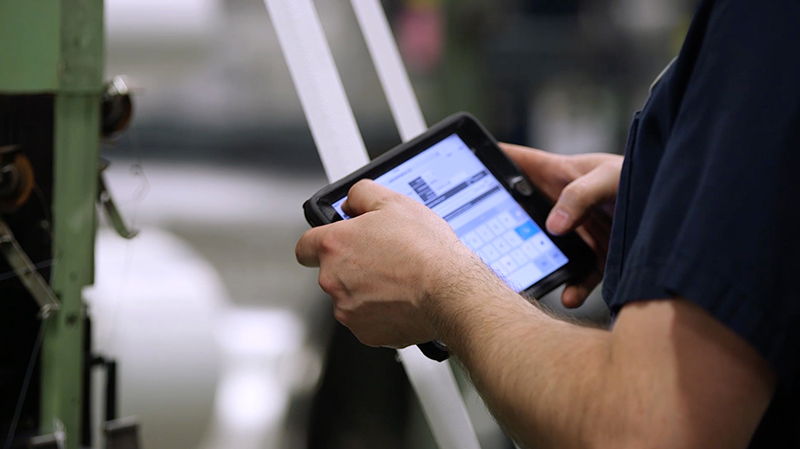January 7, 2019
by Bob Argyle
Imagine two sports teams competing in a championship game. The first team monitors each play, accounting for every development and data point as the game unfolds. This enables them to initiate changes and adapt quickly. The second team improvises with abandon, randomly focuses on offensive strategies and writes off defensive lapses as bad luck, meaning they never learn from mistakes.
While many companies would like to think they are the first team, the fact is most operate like the second team. They analyze key data long after any action can be taken to alter the outcome, and they don’t have systems in place to account for rapid developments and to respond in the moment. In essence, they do not have a clear understanding of what’s happening on the plant floor, in real time. This is how losing streaks start.
To win the game, business leaders and coaches must think proactively. They must recognize their blind spots and reimagine new approaches and systems that will give them full visibility and adaptability.
Simply put, the winning game plan is lean manufacturing technology.
Lean manufacturing has evolved significantly since its beginnings at Toyota. Today, the principles of lean manufacturing, which include eliminating waste, increasing efficiency, and maximizing customer value, can be found in technological and software applications. Contrary to popular opinion, it is not about reducing staff. Rather, the opportunity exists for companies to use technology to become leaner, and to improve their operational efficiency, decrease downtime, and increase bottom line profits.

At the core, what will make manufacturers more competitive is the presence and effective use of real-time data. With real-time data, workers and managers can see, live and in the task, exactly how a piece of equipment is functioning, each step of the production line, key worker activities, and the entire plant performance. Real-time data also brings insights into where waste is happening, where there’s too much downtime, and sheds light on unnecessary steps in the production process. This can create understanding, benchmarks, accountability, and transparency.
But not all lean manufacturing systems are created equal. Simply having access to data isn’t enough. The tipping points comes down to how the data is visualized and interpreted, how it’s used to inform decision making, how it’s communicated and shared with employees, and how it’s implemented.
As the CCO of Leading2Lean, a lean manufacturing software technology company, I have seen many companies in our industry who have data monitoring in place, but who do little to use the data to its full potential. It’s true that large quantities of real-time data can be difficult to manage, but technology exists to deliver organized and action-ready insights.
For example, solutions such as Leading2Lean’s Lean Execution System software, CloudDISPATCH, deliver real-time, visualized data to the right people at the right time so that they can make the right decisions. CloudDISPATCH is designed to integrate data from both maintenance and ERP (Enterprise Resource Planning) software so that there is a 360-degree view of the plant floor. That way, the data is both useful and actionable.
Another characteristic of the best lean manufacturing systems is that they take into account the human element, and the impact of real-time data on company culture. I have seen many industry leaders overlook the human factor. From my experience, I see human ingenuity as essential to the success of a company.
Wide access to data on the plant floor is critical. Information cannot be accessed by the few. We’ve seen with companies who have implemented CloudDISPATCH that when all employees have access to real-time data, real innovation happens. Workers have data to clearly indicate the right problems to solve. Solving these problems drives real improvement, which leads to a plant-wide sense of engagement and empowerment.
When considering the adoption of new software or technology, many business leaders ask how employees will adapt to new systems. From my experience, it comes down to the concept of value vs. effort. If you support workers with data and technology that help them do their jobs in a way that is easier and that allows them to contribute more, they will want to use it. If they are given tools to engage and problem solve, and are empowered to make meaningful changes, a positive cycle of sustained problem solving and continuous improvement will occur.
At the end of the day, lean manufacturing technology offers opportunities to not only improve performance, but to create a culture of engagement, problem solving, and innovation. With intentional applications of real-time data and informed actions, companies become unbeatable and winning streaks begin.
 Bob Argyle, Chief Customer Officer (CCO)
Bob Argyle, Chief Customer Officer (CCO)
Bob is an expert in lean manufacturing and has deep experience in manufacturing operations, maintenance, quality and automation engineering. He has developed a philosophy and core belief that winners in the new era of manufacturing will be the companies that combine the power of new technologies with the insight and creativity of the human mind.
As CCO for Leading2Lean, Bob works with the customer in all industries (Automotive, Aerospace, Electronics, Food Processing, Medical, Chemical, etc.) to help implement Leading2Lean’s proprietary Lean Execution System (LES). He oversees product implementations, ongoing support and helps customers maintain continuous improvement.
Scott Ellyson, CEO of East West Manufacturing, brings decades of global manufacturing and supply chain leadership to the conversation. In this episode, he shares practical insights on scaling operations, navigating complexity, and building resilient manufacturing networks in an increasingly connected world.